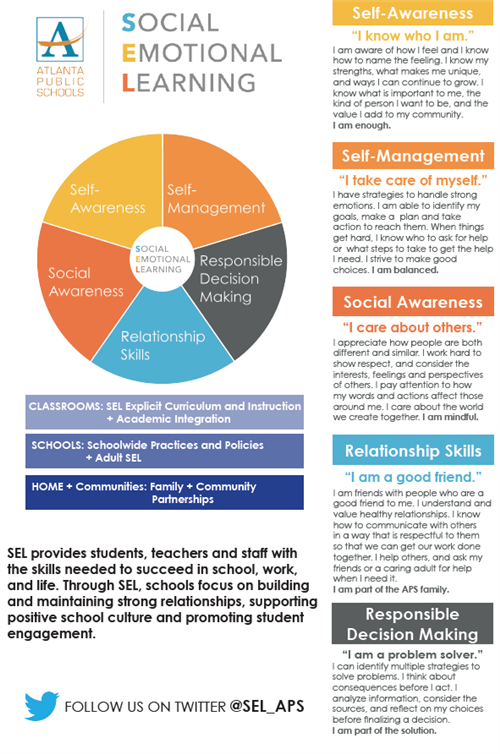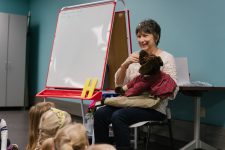If you’ve been to our library’s Exploration Stations, you’ve most likely seen the “Conversation Station” on the coloring table, with questions that use Social Emotional Learning (SEL) competencies as a framework. That’s not to say that these conversations are only for young children – we know that everyone benefits from developing their social and emotional skills, even adults!
You might be wondering, what is Social Emotional Learning? It’s the tools we have to regulate our emotions and reactions. It’s how we understand and manage emotions, set and achieve positive goals, feel and show empathy for others, establish and maintain positive relationships, and make responsible decisions. But why is this something we encourage at the library, and what are the long-term benefits?
 We as librarians want to promote evidence-based practices, and there is a wealth of research demonstrating the lasting benefits of social emotional development. In short, studies have shown that early education can improve childhood non-cognitive skills in a lasting way. We know that students who have a solid SEL foundation have better grades, test scores, and attendance than their peers. They are also more emotionally stable and have an easier time forming positive relationships.
We as librarians want to promote evidence-based practices, and there is a wealth of research demonstrating the lasting benefits of social emotional development. In short, studies have shown that early education can improve childhood non-cognitive skills in a lasting way. We know that students who have a solid SEL foundation have better grades, test scores, and attendance than their peers. They are also more emotionally stable and have an easier time forming positive relationships.
Especially in the current climate, it’s important to develop these skills in our children, to help them process the changes they’ve experienced over the last couple months. Developing these skills isn’t as challenging as it may seem – modeling the behavior you want to see is a great first step. And then, of course, the conversations we encourage in our programs. Atlanta Public schools have a wonderful infographic (see right) explaining the SEL competencies, and you can build your questions from there.
Here’s a sample of some of the questions we included in our Conversation Station booklets:
Self-Awareness
- What makes you special?
- How are you feeling right now?
- What sorts of things do you need help with?
- Why are you important in your family?
Self-Management
- How do you handle stressful situations?
- How do you act when you are excited? Nervous? Scared?
- What do you want to do today?
- How do you get what you want?
Social Awareness
- How can you tell when someone is sad?
- What makes your friends special?
- What are your friends good at?
- How can you tell when someone needs help?
Relationship Skills
- What does it mean to be a good friend?
- How do you ask your friends for help?
- What do you do when someone is mean to you?
- How do you show your friends that you care about them?
Responsible Decision Making
- What are you not able to do on your own?
- Do you think about what will happen after you do something?
- Who do you trust? Why do you trust them?
- If someone has something you want, what do you do?
It may seem like some of these questions have obvious answers–– but we know that children are not born with this knowledge. They are either taught how to interact and manage themselves, or they learn from the people around them. Additionally, you may already use these questions in your home! How often do you ask your children what they want to do? It’s part of many of our days, once our children are able to voice their preferences. But this simple action develops several skills: it shows children that their opinion matters and increases their sense of self-worth and self-awareness. It models to them how they can interact with other people, by caring about what others want. For you as the “grown-up,” practicing these conversations also helps build a foundation for future emotional development with your child.
If you have any questions about SEL, feel free to contact us. For more information, here’s a few great SEL-related resources:
Social Emotional Learning Overview, Roger P. Weissberg & Jason Cascarino
The Impact of Enhancing Students’ Social and Emotional Learning: A Meta-Analysis of School-Based Universal Interventions, Joseph Durlak, Roger P. Weissberg, Allison Dymnicki, Rebecca Taylor, & Kriston Schellinger
The Positive Impact of Social and Emotional Learning for Kindergarten to Eighth-Grade Students, John Payton, Roger P. Weissberg, Joseph A. Durlak, Allison B. Dymnicki, Rebecca D. Taylor, Kriston B. Schellinger, Molly Pachan


 Recently I began a new phonological awareness program with the kids in Smart Start Story Time. This program is from the curriculum adopted by Greenwood Schools by Michael Heggerty, PhD and is the pre-kindergarten component. Phonemic awareness refers to the ability to manipulate individual sounds in spoken words. This is one of the most important skills that predict reading ability. So, if you hear the familiar refrain of, “It’s rhyming time, it’s rhyming time, it’s rhyming time, OH YEAH!!!!” That’s one of our new warm up exercises in story time. We will be doing, “Take 2 words and put them together” for compound words and lots of work on the first and last sound you hear in a word. Research has shown that playing with words in this way helps develop their expertise in isolating sounds. According to the website, Reading Rockets, here are some things you can do at home:
Recently I began a new phonological awareness program with the kids in Smart Start Story Time. This program is from the curriculum adopted by Greenwood Schools by Michael Heggerty, PhD and is the pre-kindergarten component. Phonemic awareness refers to the ability to manipulate individual sounds in spoken words. This is one of the most important skills that predict reading ability. So, if you hear the familiar refrain of, “It’s rhyming time, it’s rhyming time, it’s rhyming time, OH YEAH!!!!” That’s one of our new warm up exercises in story time. We will be doing, “Take 2 words and put them together” for compound words and lots of work on the first and last sound you hear in a word. Research has shown that playing with words in this way helps develop their expertise in isolating sounds. According to the website, Reading Rockets, here are some things you can do at home: